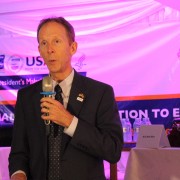Speeches Shim
As educators, you all know how critical reading skills are to establishing the foundations for successful learning and supporting development. Those skills enable the wonder and joy that can come through education, and they are best acquired at an early age. Albert Einstein made the point in a beautiful expression as follows: “It is the supreme art of the teacher to awaken joy in creative expression and knowledge.” As teachers, educators, administrators and policy makers, we owe it to our young learners to help them acquire the spark that unleashes their creative spirits and talents.

On behalf of the U.S. government and Ambassador Malac, I would like to take this opportunity to thank the Government of Uganda, and specifically the Ministry of Health and local government, for being here today. I am honoured to join you in celebrating USAID’s renewal of partnerships in support for healthy outcomes in the Lango region. Together, we are stronger in our commitment to address challenges in the Lango sub-region and put forth coordinated solutions to improve Lango’s health systems. Though we are here to celebrate this launch, I also want to express our condolences regarding the losses of esteemed leaders in Lira mentioned earlier.
USAID/Uganda’s Country Development Cooperation Strategy (CDCS) 2016 – 2021 aims to work towards ensuring that “Uganda’s systems are accelerating inclusive education, health and economic outcomes.” Six integrated projects are planned, to contribute to the achievement of this goal. They are: i)Resilience Project, ii) Demographic Drivers Project, iii) Market Systems Project, iv) Natural ResourcesManagement Systems Project, v) Health Systems Project, and vi) Governance and Citizen Participation Systems Project. The respective projects are elaborated in interrelated Project Appraisal Documents (PADs). For these projects to be effectively implemented, USAID/Uganda recognizes that it is important to integrate gender equality and inclusion of vulnerable groups. USAID therefore commissioned this gender and social inclusion analysis, to identify key gender and inclusive development issues and constraints that need to be addressed within its portfolio and to recommend how USAID/Uganda can achieve greater inclusive development in its programs.
I want to begin by appreciating the hard work and commitment that all of you here have undertaken to strengthen Uganda’s institutions of accountability over the past two years. When we look at what was identified in 2014, the last time this joint review with donors took place, as the key challenges in the sector and then examine the progress that has been made, I think there is a lot to be proud of. From the passage of the PFM Act 2015, to the amendment of tax laws and regulations to increase domestic resource mobilization, to efforts to reach out and include civil society and more citizens’ voices, to the imminent installment of a new e-procurement system, much has been accomplished.
Uganda is in the midst of a demographic tsunami with its population doubling every 16 years. Uganda’s systems must be transformed to rapidly increase agricultural productivity, curb accelerating environmental degradation, alleviate the burden of communicable diseases, and educate and train a more and increasingly younger population of Ugandans that need to be both more productive and more involved as citizens. The rapidly growing population exacerbates high levels of youth unemployment and amplifies pressures on social, natural and other resources. Inadequately addressed, these issues will lead to a growing number of marginalized Ugandans without access to public or other services; lacking resilience to shocks and stresses; and held back from their progress; and, thus, unable to realize their individual or collective potential.


Comment
Make a general inquiry or suggest an improvement.